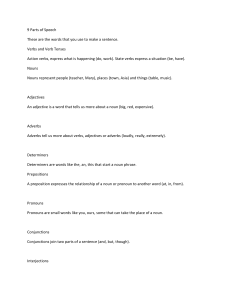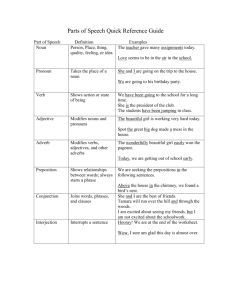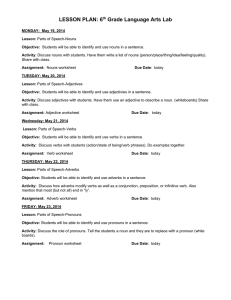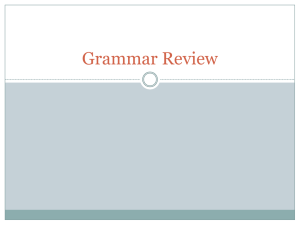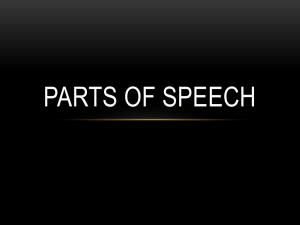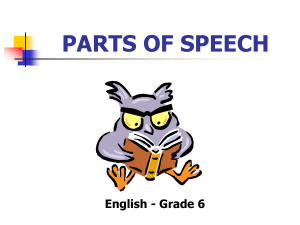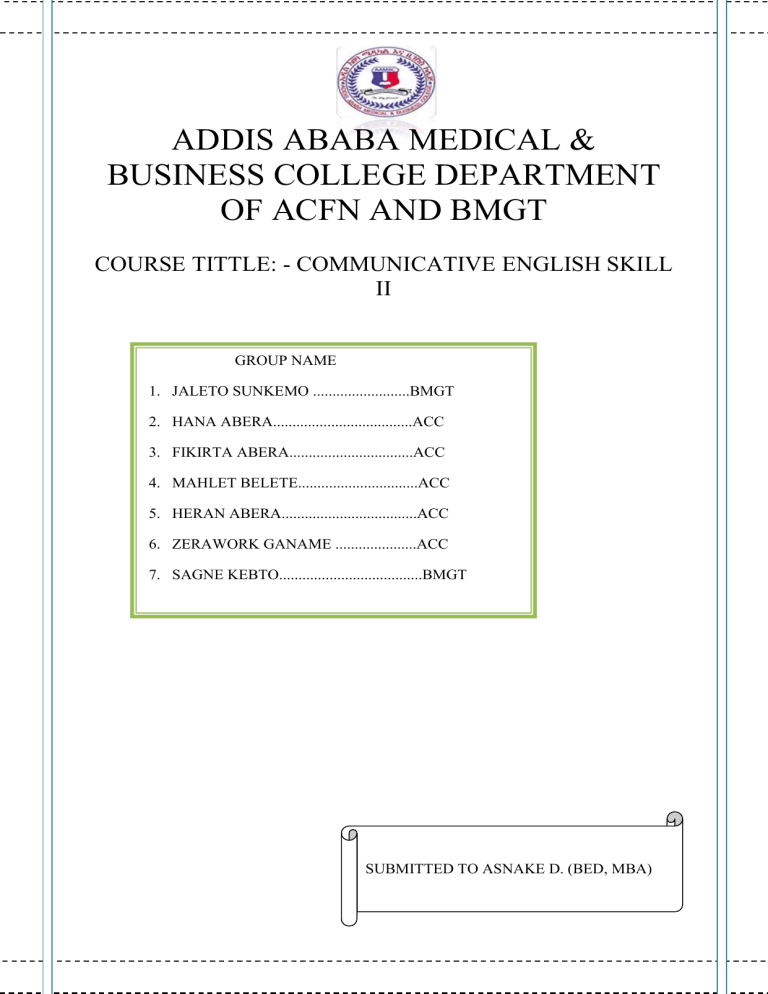
ADDIS ABABA MEDICAL & BUSINESS COLLEGE DEPARTMENT OF ACFN AND BMGT COURSE TITTLE: - COMMUNICATIVE ENGLISH SKILL II GROUP NAME 1. JALETO SUNKEMO .........................BMGT 2. HANA ABERA....................................ACC 3. FIKIRTA ABERA................................ACC 4. MAHLET BELETE...............................ACC 5. HERAN ABERA...................................ACC 6. ZERAWORK GANAME .....................ACC 7. SAGNE KEBTO.....................................BMGT SUBMITTED TO ASNAKE D. (BED, MBA) Parts of Speech There are eight parts of speech. 1. Nouns 2. Pronouns 3. Verbs 4. Adverbs 5. Adjectives 7. Conjunctions 8. Interjections 6. Prepositions What is a Part of Speech? A part of speech is a group of words that are used in a certain way. group. In other words, all words in the English language are divided into eight different categories. Each category has a different role/function in the sentence. English Parts of Speech 1. Nouns = A word that names a person, a place or a thing Boy, Sam, cat, Paris 2. Pronouns:= A word that is used instead of a noun He, my, yourself 3. Adjectives:- A word that describes a person or thing pretty, easy, fat 4. Verbs:- A word or group of words that express an action or a state go, jump, be, think 5. Adverbs:- A word that describes or gives more information about a verb, an adjective, another adverb, or even the entire sentence quickly, tomorrow, outside 6. Prepositions:- A word that is used before a noun or a pronoun to connect it to another word in the sentence. It is usually used to show location, direction, time, and so forth on, in, to, from, of 7. Conjunctions:- A word that joins parts of a sentence together and, or, but 8. Interjections:- A short sound, word or phrase used to express the speaker's emotion. Wow, hmm, well, oh dear A. Nouns A noun is a word that names a person, a place or a thing. Examples: Sarah, lady, cat, New York, Canada, room, school, football, reading. Example sentences: People like to go to the beach. 1. Abstract Nouns An abstract noun is a noun that names an idea, not a physical thing. Examples: Hope, interest, love, peace, ability, success, knowledge, trouble. 2. Concrete Nouns A concrete noun is a noun that names a physical thing. Examples: Boy, table, floor, coffee, beach, king, rain, children, professor. 3. Common Nouns A common noun is a noun that names a general thing, not a specific thing. Examples: Boy, girl, city, country, company, planet, location, war. 4. Proper Nouns A proper noun is a noun that indicates the specific name of a thing. It begins with a capital letter.Examples: Robin, Alice, London, Sweden, Google, Earth, Eiffel Tower, Civil War. (Compare these examples to ones in the "Common nouns" section to see the difference.) 5. Countable Nouns A countable noun is a noun that indicates something you could actually count. For example, you could count pigs: one pig, two pigs, three pigs... However, you cannot count water: one water, two water – no, it doesn't work... A countable noun has both a singular and a plural form, and it can be used with the indefinite articles (a/an). Examples: COMMUNICATIVE ENGLISH SKILL II Page 2 Window, teacher, tree, lion, eye, cloud, pencil, heart, movie. Uncountable Nouns An uncountable noun is a noun that indicates something you cannot count. For example, you could count pigs: one pig, two pigs, three pigs... However, you couldn't count water: one water, two water – no, it doesn't work... An uncountable noun has only one form (no plural), and it cannot be used with the indefinite articles (a/an). Examples: Furniture, advice, mail, news, equipment, luggage, work, coffee, information. Pronouns A pronoun is a word that is used instead of another noun. For example, you could say "Lisa is a nice girl." Then you can replace the noun "Lisa" with the word "She" and get the following sentence: "She is a nice girl." "She" is a pronoun. Examples: I, he, it, we, them, us, mine, itself. Example sentences: He doesn't want go with them. Who is she? The word "pronoun" comes from "pro" (in the meaning of "substitute") + "noun." Kinds of Pronouns 1. Personal Pronouns Personal pronouns represent people or things. The personal pronouns are: I, you, he, she, it, we, they, me, him, her, us, them. 2. Demonstrative Pronouns "Demonstrative" means "showing, making something clear." Demonstrative pronouns point to things. The demonstrative pronouns are: this, that, these, those. Use "this" and "these" to talk about things that are near in space or in time. Use "that" and "those" to talk about things that are farther away in space or time. Example sentence: This cannot go on. 3. Interrogative Pronouns "Interrogative" means "used in questions." Interrogative pronouns are used to ask questions. The interrogative pronouns are: who, whom, which, what, whoever, whatever, etc. Use "who" and "whom" to talk about people. Use "which" and "what" to talk about animals and things. Example sentences: Who is your father? Whom did you speak to? 4. Possessive Pronouns "Possessive" means "showing ownership." Possessive pronouns indicate that something belongs to somebody/something. The possessive pronouns are: my, your, his, her, its, our, their, mine, yours, his, hers, ours, theirs. Example sentences: I've lost my wallet. He married his girlfriend. 5. Relative Pronouns "Relative" means "connected with something." Relative pronouns are pronouns that link different parts of a sentence. The relative pronouns are: who, whom, which, that, whoever, etc. Examples sentences: The girl who called yesterday came to see you. The teacher whom you wrote has answered your questions. 6. Reflexive Pronouns "Reflexive" means "going back to itself." Reflexive pronouns show that the action affects the person who performs the action. Reflexive pronouns end in "-self" (singular) or "-selves" (plural). The reflexive pronouns are: myself, yourself, himself, herself, itself, ourselves, themselves. Example sentences: COMMUNICATIVE ENGLISH SKILL II Page 3 He cut himself while shaving. I sent myself to bed. 7. Intensive Pronouns "Intensive" means "giving force or emphasis." An intensive pronoun is a pronoun used for emphasis. In other words, Intensive pronouns emphasis the subject of the sentence. They are written exactly the same way as the reflexive nouns, but their function is different. I myself baked the cake. The queen herself recommended this restaurant. 8. Indefinite Pronouns "Indefinite" means "not exact, not limited." Indefinite pronouns are pronouns that do not refer to any specific person or thing. Examples: Anything, everybody, another, each, few, many, none, some. Example sentences: Many have died during the war. Adjectives An adjective is a word that describes a person or thing. Examples: Big, pretty, expensive, green, round, French, loud, quick, fat. Example sentences: He has big blue eyes. The new car broke down. The word "adjective" comes from the Latin word jacere, which means "to throw." Different Types of adjectives Adjectives can be divided into several types: Opinion = Nice, pretty, stupid, original, expensive, etc. Size = Big, small, large, tiny, enormous, little, etc. Age = Young, old, new, ancient, antique, etc. Shape = Round, square, flat, straight, etc. Color = Blue, red, white, black, dark, bright, yellowish, etc. Material = Metal, wooden, plastic, golden, etc. A noun can have several adjectives describing it. Examples: "She bought a new red Italian table." "He is a great, successful father." Comparative adjectives "Comparative" means "comparing something to something else." Comparative adjective show us which thing is better, worse, stronger, weaker, and so forth. Examples: Better, worse, bigger, smaller, nicer, fatter, thiner, more dangerous. Example sentences: She is a better student than her brothers. Superlative adjectives "Superlative" means "of the highest degree." Superlative adjectives show us which thing is the best, the strongest, and so forth. Examples: Best, worst, strongest, smallest, cheapest, most expensive. Example sentences: You are my best friend. This is the worst day of my life. Verbs A verb is a word or group of words that express an action or a state. Examples: Go, jump, sleep, eat, think, be, change, become, drive, complete. Example sentences: We had a nice lunch. The word "verb" comes for the Latin word verbum, which means "word." Auxiliary Verbs (also called "helping verbs") Auxiliary verbs are verbs that are used together with the main verb of the sentence to express the action or state. COMMUNICATIVE ENGLISH SKILL II Page 4 Main verb + auxiliary verb = complete idea The main auxiliary verbs are: be, am, is, are, was, were, do, does,did, have, has, had. Example sentences (the auxiliary verb is bold, and the main verb is underlined): They are jogging. She was sitting. We were waiting for hours. 1. Compound Verbs A compound verb = auxiliary verb + main verb. Examples: was playing, has eaten, doesn't want. They were discussing their future. He didn't tell us the truth. 2. Stative Verbs Stative verbs are verbs that express a state rather than an action. Examples: be, seem, love, own, want, sound, have, know, understand. Examples sentences: She is a great wife. Stative verbs are usually not used in the progressive tenses. Examples: Incorrect: He is wanting to see you. Correct: He wants to see you. However, if the same verb is used to describe an actual action (not a state) than it can be used in the progressive tenses. 3. Dynamic Verbs Dynamic verbs are the opposite of stative verbs. They express a real action. Examples: Jump, swim, catch, write, call, sleep, hit, open, speak. Example sentences: They swam to the other side. She hit me on the head! 4. Regular Verbs Regular verbs are verbs that follow this rule: Past form of the verb = present form of the verb + ed / d. Examples: Past form of "check" = check + ed = checked. There are certain rules to adding "d" or "ed" to a verb. Read about them in the Regular Verbs and Irregular Verbs section. 5. Irregular Verbs Irregular verbs are verbs that do not follow the above rule, and there are quite a lot of them! Examples: Past form of "drink" = drank. 6. Phrasal Verbs A phrasal verb is a verb that is combined with an adverb or a preposition. The combination creates a new meaning. Examples: Run = to move very quickly with your legs. ("She can run fast!") Into = in the direction of something. ("He looked into my eyes.") Adverbs An adverb is a word that describes or gives more information about a verb, an adjective, another adverb, or even the entire sentence. Adverbs usually answer the following questions: COMMUNICATIVE ENGLISH SKILL II Page 5 Where? Home. ("I went home.") When? Yesterday. ("We met yesterday.") An adverb can describe a verb: The word "adverb" comes for the Latin ad- (in addition) and verbum (word). In many cases (but not always!) adverbs have the following form: Adjective + "-ly" Examples: Quick + ly = quickly Strange + ly = strangely Dead + ly = deadly Adverbs of degree Adverbs of degree show us the strength or degree of the action or state. They answer the following questions: How much? To what degree? Examples: Very, highly, totally, perfectly, partially, almost. Example sentences: He is very concerned with you. Adverbs of manner Adverbs of manner show us the way the action is done. They answer the following question: How? Examples: Well, badly, nicely, slowly, loudly, quietly, happily, sadly, secretly, weakly. Example sentences: He handled the situation well. Adverbs of place Adverbs of place show us the location of the action or state. They answer the following question: Where? Examples: Home, here, there, outside, inside, away, around, anywhere, abroad, up, down, out. Example sentences: We are here. Adverbs of time Adverbs of time show us the time of the action or state. They answer the following question: When? Examples: Now, soon, later, yesterday, tomorrow, early, before, lately, recently. Example sentence: Let's talk now. I will do it later. Adverbs of frequency Adverbs of frequency show us the frequency of the action or state. They answer the following question: How often? Examples: Always, never, sometimes, often, rarely, usually, occasionally. Example sentences: I always brush my teeth after a meal. Adverbs of duration Adverbs of duration show us the length of the action or state. They answer the following question: For how long? Examples: Forever, constantly, temporarily, briefly. Example sentence: He works there temporarily. Adverbs of probability Adverbs of probability show us the chances for the action or state to happen. They answer the following question: How likely? Examples: Certainly, maybe, probably, possibly, surely. Example sentences: She will certainly forget about it. Comparative adverbs "Comparative" means "comparing something to something else." Comparative adverbs show us which action or state is better, worse, stronger, weaker, and so forth. COMMUNICATIVE ENGLISH SKILL II Page 6 Examples: more, less, better, worse, faster, slower, farther, closer. Example sentences: Maggie works out more seriously than Donna. Superlative adverbs "Superlative" means "of the highest degree." Superlative adverbs show us which action or state is the best, the strongest, and so forth. Examples: Best, most, least, worst, strongest, fastest, slowest. Example sentences: He knows best. Prepositions A preposition is a word that is used before a noun or a pronoun to connect it to another word in the sentence. It is usually used to show location, direction, time, and so forth. Examples: On, in, at, by, under, above, beside, to, out, from, for. Example sentences: I sat on the floor. The word "preposition" comes from the Latin word praeponere (put before). So prepositions usually come before the noun/pronoun. Conjunctions A conjunction is a word that joins parts of a sentence together. Examples: And, but, or, because, so, for, nor, or, yet. Example sentences: I want to come, but I can't. The word "conjunction" comes from the Latin word conjungere (join together). Interjections An interjection is a short sound, word or phrase used to express the speaker's emotion. Examples: Oh! Look out! Ow! Hey! Wow! Ah! Um... Example sentences: Wow, that's amazing! The word "interjection" comes from the Latin word interjicere (throw between). Relative Clause This is a clause that generally modifies a noun or a noun phrase and is often introduced by a relative pronoun (which, that, who, whom, whose). A relative clause connects ideas by using pronouns that relate to something previously mentioned and allows the writer to combine two independent clauses into one sentence. A relative clause is also known as an adjective clause. There are two types of relative clauses: restrictive and nonrestrictive. Here are a few examples: o o The book that she read was important for her literature review. (restrictive) The participants who were interviewed volunteered to be part of the study. (restrictive) Restrictive who, whom, that* which, that** whose Nonrestrictive (with commas) who, whom which whose COMMUNICATIVE ENGLISH SKILL II Page 7
